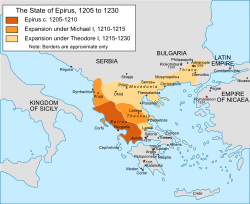
Back إمبراطورية ثيسالونيكة Arabic Солунска империя Bulgarian Soluňské císařství Czech Αυτοκρατορία της Θεσσαλονίκης Greek Imperio de Tesalónica Spanish Empire de Thessalonique French Imperio de Tesalónica Galician Despotato di Tessalonica Italian テッサロニキ帝国 Japanese Солунско Царство Macedonian
Empire of Thessalonica | |||||||||||||
|---|---|---|---|---|---|---|---|---|---|---|---|---|---|
| 1224–1246 | |||||||||||||
 Conquests of the Komnenodoukas dynasty of Epirus until the Battle of Klokotnitsa | |||||||||||||
| Status | Vassal of the Second Bulgarian Empire (1230–37) and of the Empire of Nicaea (1242–46) | ||||||||||||
| Capital | Thessalonica | ||||||||||||
| Common languages | Greek | ||||||||||||
| Religion | Greek Orthodoxy (official)[1] | ||||||||||||
| Government | Monarchy | ||||||||||||
| Emperor, after 1242 Despot | |||||||||||||
• 1224–1230 | Theodore Komnenos Doukas | ||||||||||||
• 1244–1246 | Demetrios Angelos Doukas | ||||||||||||
| Historical era | Middle Ages | ||||||||||||
• Epirus conquest of Thessalonika | 1224 | ||||||||||||
• Fall of Thessalonica to Nicaea | 1246 | ||||||||||||
| |||||||||||||
The Empire of Thessalonica is a historiographic term used by some modern scholars[2] to refer to the short-lived Byzantine Greek state centred on the city of Thessalonica between 1224 and 1246 (sensu stricto until 1242) and ruled by the Komnenodoukas dynasty of Epirus. At the time of its establishment, the Empire of Thessalonica, under the capable Theodore Komnenos Doukas, rivaled the Empire of Nicaea and the Second Bulgarian Empire as the strongest state in the region, and aspired to capturing Constantinople, putting an end to the Latin Empire, and restoring the Byzantine Empire that had been extinguished in 1204.
Thessalonica's ascendancy was brief, ending with the disastrous Battle of Klokotnitsa against Bulgaria in 1230, where Theodore Komnenos Doukas was captured. Reduced to a Bulgarian vassal, Theodore's brother and successor Manuel Komnenos Doukas was unable to prevent the loss of most of his brother's conquests in Macedonia and Thrace, while the original nucleus of the state, Epirus, broke free under Michael II Komnenos Doukas. Theodore recovered Thessalonica in 1237, installing his son John Komnenos Doukas, and after him Demetrios Angelos Doukas, as rulers of the city, while Manuel, with Nicaean support, seized Thessaly. The rulers of Thessalonica bore the imperial title from 1225/7 until 1242, when they were forced to renounce it and recognize the suzerainty of the rival Empire of Nicaea. The Komnenodoukai continued to rule as Despots of Thessalonica for four more years after that, but in 1246 the city was annexed by Nicaea.
- ^ Katsikas, Stefanos (2022). Proselytes of a New Nation: Muslim Conversions to Orthodox Christianity in Modern Greece. Oxford University Press. p. 3. ISBN 9780197621752.
- ^ e.g. Finlay 1877, pp. 124ff.,Vasiliev 1952, p. 522, Bartusis 1997, p. 23, Magdalino 1989, p. 87.
© MMXXIII Rich X Search. We shall prevail. All rights reserved. Rich X Search